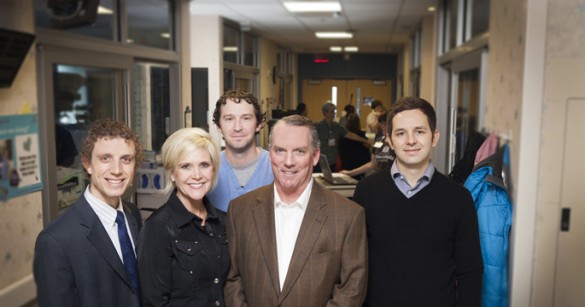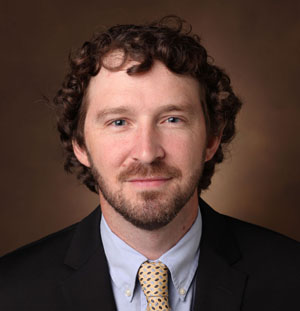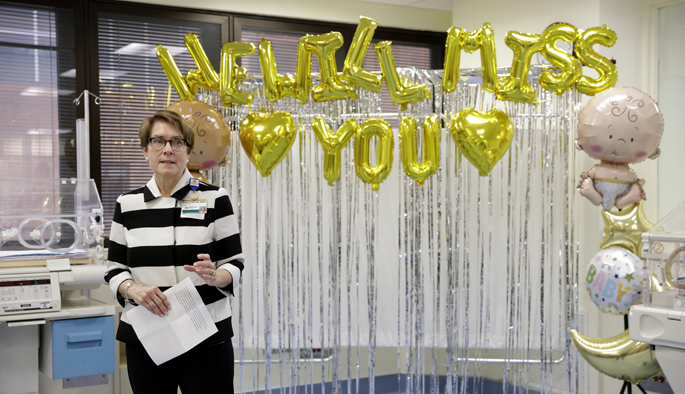
Dupree Hatch, M.D., shrugs off the sleep deprivation from a night taking care of babies in the neonatal intensive care unit and launches into a discussion of his efforts to describe — and reduce — adverse events associated with intubation in the NICU.
Hatch, who is completing his final year of fellowship in Neonatal-Perinatal Medicine and a Master of Public Health degree, is excited that his research has the potential to improve patient care in Vanderbilt’s NICU, and beyond.
“We’ve made some changes to our intubation procedures, and we have some early data that look like we’re reducing the adverse event rate,” Hatch said. “We won’t know for sure until the end of the project, but we’re very happy with it so far.”
Supporting the scholarly pursuits and training of physicians like Hatch — who may have a broad impact on the field of neonatology — is the purpose of the John and Leslie Hooper Neonatal-Perinatal Endowment Fund. Hatch is one of the first of many Hooper fellows.
Five years ago, the Hoopers’ eldest daughter had a medical scare that required surgery and a three-week stay at Monroe Carell Jr. Children’s Hospital at Vanderbilt.
“I’m from Nashville, and I had always known about how important Children’s Hospital is to the community, but our experience really put it front and center for us,” said John Hooper, who now serves on the Children’s Hospital Board. “We wanted to do our part to support this amazing place.”
In conversations with senior leaders, John Hooper asked how his family’s financial gift could have the most impact.
Their answer: by providing funding for fellowship training.
“Light bulbs went off,” Leslie Hooper recalled. “We wanted to add to the success of Children’s Hospital, and when we learned about supporting fellowship training, we thought, ‘that’s perfect.’”
“In strengthening the development of future doctors and future discoveries, our gift becomes perpetual,” John Hooper said. The Hoopers opted to establish an endowment in neonatal-perinatal medicine to advance the training of physicians who care for the most vulnerable and helpless patients at Children’s Hospital.
Susan Guttentag, M.D., Julia Carell Stadler Professor of Pediatrics and director of the Division of Neonatology, called the Hoopers’ gift “visionary.”
“What I think is so remarkable about this gift is that the Hoopers see that they have the opportunity to change the face of neonatology by growing the next generation of thought leaders in the field,” Guttentag said.
The Hooper Fund, established in 2012, provides financial support for research and advanced education of neonatology fellows.
Guttentag explained that the American Board of Pediatrics requires a scholarly component in subspecialty fellowship training — not only so that trainees add new knowledge to the field, but also so they “develop an appreciation for how to approach problems, how to develop plans to answer questions and how to interpret the results of those plans,” she said.
“Once fellowship training is over, the learning isn’t over, because medicine is a dynamic, changing field,” Guttentag said. “Physicians need to constantly be reading the literature and assessing for themselves whether they want to bring reported changes into their practices.”
Encouraging research during fellowship training “requires an influx of money for fellows to actually do the projects and to offer educational opportunities in research methodologies,” Guttentag said.
“We’re all hopeful that our fellows are going to become the thought leaders of tomorrow,” she said. “The best way we can do that is to provide them with rich training environments.
“Having the kind of unrestricted support that the Hooper Fund provides, that we can use for any research area, is extraordinary in allowing our fellows to reach the potential we know they have.”
Vanderbilt has a long history of innovation in neonatal-perinatal medicine. Mildred Stahlman, M.D., professor of Pediatrics, developed the nation’s first NICU here in the 1960s, and the fellowship program, established in 1962, is one of the oldest training programs in the country. The competitive program has 120 applicants this year for four training positions.
It was the division’s outstanding reputation and research opportunities that attracted Matthew Durbin, M.D., another recipient of Hooper endowment funding.
“I’m honored to train in such a historic program,” Durbin said.
Durbin is working with Charles Hong, M.D., Ph.D., associate professor of Medicine, to search for the genetic changes that cause congenital heart disease. They are taking advantage of a unique resource — a tissue bank containing post-operative samples from children who have had heart surgery at Vanderbilt, established by David Bichell, M.D., Cornelius Vanderbilt Professor of Surgery.
“The tissue bank is a really valuable resource. From it, we are able to make patient-specific tissue cultures of cardiac muscle cells to study how they form, how they beat, and how their characteristics differ from normal cardiac muscle cells.”
Durbin stressed how important the Hooper funding is for his research.
“Research is very expensive, and having this support provides more flexibility to pursue these exciting opportunities,” he said.
Another Hooper fellow, Kevin Dufendach, M.D., is working on his master’s degree in Biomedical Informatics and is building new computer interfaces to improve NICU patient care.
His ultimate goal, he said, is to help design the screens, menus and ways providers interact with the computer “so that we can spend less time in front of the computer screen and more time in direct patient care.”
Dufendach is currently writing interactive survey software to help develop an improved tool for patient handoffs — when a new provider takes over patient care — in the NICU.
“We’ll give the survey to neonatal providers, and they will actually design their own handoff tool by selecting the items they want to see. When the tool is as they want it, they press the submit button. What they’ve designed is their survey response. What we’d like to see is some consensus amongst neonatal providers about what data should be presented during patient handoffs.”
For Dufendach, the Hooper fellowship is allowing him to do additional statistical analyses and to share his research and tools more broadly. He is already working with several outside institutions that would like to use this type of survey.
“The Hooper funds really help me to extend my reach,” Dufendach said. “To me, improvements in neonatology will come through biomedical informatics and being able to better take care of patients by using our technology and our computer systems to their fullest.”
“It’s so amazing to meet these fellows,” Leslie Hooper said after a recent visit to Children’s Hospital. “They are so enthusiastic and excited to tell us about what they’re doing. It’s great.”














